http://www.zerohedge.com/news/2013-06-16/nsa-uk-spied-politicians-intercepted-emails-eavesdropped-russian-presidents-phone-ca
NSA, UK Spied On Politicians, Intercepted Emails, Eavesdropped On Russian President's Phone Calls
Submitted by Tyler Durden on 06/16/2013 17:23 -0400
The espionage scandal that keeps on giving has released its latest installment, once more courtesy of the Guardian, which on the eve of tomorrow's starting G-8 meeting reveals that foreign politicians and officials who took part in two G-20 summit meetings in London in 2009 had their computers monitored, their phone calls intercepted, and fake internet cafes were set up on the instructions of the British Government Communications Headquarters (GCHQ), the sister organization to the US NSA.
Naturally, it wasn't just the GCHQ - according to the Guardian, during the 2009 G-20 meeting there was an NSA attempt to eavesdrop on then-Russian leader, Dmitry Medvedev, as his phone calls passed through satellite links to Moscow.
And while broad espionage allegations can be deflected by pretending by the rhetoric-endowed and teleprompter-aided that only terrorist threats were targeted, it will be very difficult to explain why the national information super spooks used every trick of the trade to spy on the so-called leaders of the developed world.
The disclosure raises new questions about the boundaries of surveillance by GCHQ and its American sister organisation, the National Security Agency, whose access to phone records and internet data has been defended as necessary in the fight against terrorism and serious crime. The G20 spying appears to have been organised for the more mundane purpose of securing an advantage in meetings. Named targets include long-standing allies such as South Africa and Turkey.
And like that, one more conspiracy theory is relegated to the "fact" bin, as those using the "tin foil, crack-pot conspiracy theorists" fallback, are slowly becoming the biggest laughing stock in town.
So who gave the green light for this blatant spying operation, which assuredly takes place at every meeting of the world's leading political (and other) dignitaries? Why that supreme gold top-tick timer himself, Gordon Brown:
There have often been rumours of this kind of espionage at international conferences, but it is highly unusual for hard evidence to confirm it and spell out the detail. The evidence is contained in documents – classified as top secret – which were uncovered by the NSA whistleblower Edward Snowden and seen by the Guardian.They reveal that during G20 meetings in April and September 2009 GCHQ used what one document calls "ground-breaking intelligence capabilities" to intercept the communications of visiting delegations.
The timing of today's release comes at a perfect time, just as yet another G-8 meeting is due to commence shortly in the UK:
The revelation comes as Britain prepares to host another summit on Monday – for the G8 nations, all of whom attended the 2009 meetings which were the object of the systematic spying. It is likely to lead to some tension among visiting delegates who will want the prime minister to explain whether they were targets in 2009 and whether the exercise is to be repeated this week.
What else did the revealed G-20 spying consist of:
- Setting up internet cafes where they used an email interception programme and key-logging software to spy on delegates' use of computers;
- Penetrating the security on delegates' BlackBerrys to monitor their email messages and phone calls;
- Supplying 45 analysts with a live round-the-clock summary of who was phoning who at the summit;
- Targeting the Turkish finance minister and possibly 15 others in his party;
It just goes downhill from there:
A briefing paper dated 20 January 2009 records advice given by GCHQ
officials to their director, Sir Iain Lobban, who was planning to meet
the then foreign secretary, David Miliband. The officials summarised
Brown's aims for the meeting of G20 heads of state due to begin on 2
April, which was attempting to deal with the economic aftermath of the
2008 banking crisis. The briefing paper added: "The GCHQ intent is to
ensure that intelligence relevant to HMG's desired outcomes for its
presidency of the G20 reaches customers at the right time and in a form
which allows them to make full use of it." Two documents explicitly
refer to the intelligence product being passed to "ministers".According to the material seen by the Guardian, GCHQ generated this
product by attacking both the computers and the telephones of delegates.
Most importantly, the bullshit excuse that spying by the GCHQ and the NSA, was being done to safeguard the safety and security of "the people" will no longer fly. And if anything, the latest set of disclosures should generate a diplomatic scandal of unprecedented proportions. Alas, in a world in which everyone is broke and reliant on the goodwill of the Fed, and by implication, the Fed's code breakers, the NSA, we wouldn't be surprised if nothing happens.
Other documents record apparently successful efforts to penetrate the security of BlackBerry smartphones: "New converged events capabilities against BlackBerry provided advance copies of G20 briefings to ministers … Diplomatic targets from all nations have an MO of using smartphones. Exploited this use at the G20 meetings last year."The operation appears to have run for at least six months. One document records that in March 2009 – the month before the heads of state meeting – GCHQ was working on an official requirement to "deliver a live dynamically updating graph of telephony call records for target G20 delegates … and continuing until G20 (2 April)."Another document records that when G20 finance ministers met in London in September, GCHQ again took advantage of the occasion to spy on delegates, identifying the Turkish finance minister, Mehmet Simsek, as a target and listing 15 other junior ministers and officials in his delegation as "possible targets". As with the other G20 spying, there is no suggestion that Simsek and his party were involved in any kind of criminal offence. The document explicitly records a political objective – "to establish Turkey's position on agreements from the April London summit" and their "willingness (or not) to co-operate with the rest of the G20 nations".The September meeting of finance ministers was also the subject of a new technique to provide a live report on any telephone call made by delegates and to display all of the activity on a graphic which was projected on to the 15-sq-metre video wall of GCHQ's operations centre as well as on to the screens of 45 specialist analysts who were monitoring the delegates."For the first time, analysts had a live picture of who was talking to who that updated constantly and automatically," according to an internal review.A second review implies that the analysts' findings were being relayed rapidly to British representatives in the G20 meetings, a negotiating advantage of which their allies and opposite numbers may not have been aware: "In a live situation such as this, intelligence received may be used to influence events on the ground taking place just minutes or hours later. This means that it is not sufficient to mine call records afterwards – real-time tip-off is essential."
The surveillance got so far as reading people's emails at the same time as they typed!
One document refers to a tactic which was "used a lot in recent UK conference, eg G20". The tactic, which is identified by an internal codeword which the Guardian is not revealing, is defined in an internal glossary as "active collection against an email account that acquires mail messages without removing them from the remote server". A PowerPoint slide explains that this means "reading people's email before/as they do".
End result: a very grateful GCHQ:
In the week after the September meeting, a group of analysts sent an internal message to the GCHQ section which had organised this live monitoring: "Thank you very much for getting the application ready for the G20 finance meeting last weekend … The call records activity pilot was very successful and was well received as a current indicator of delegate activity …"It proved useful to note which nation delegation was active during the moments before, during and after the summit. All in all, a very successful weekend with the delegation telephony plot."
And now we go back to your regularly scheduled prime-time soap opera tragicomedy for idiots, in which the protagonists read from teleprompters advising the same idiots, that only terrorist suspects are targeted by the totalitarian superstate, and that no matter what, one should trust the government - after all they are only here to help you.
http://www.guardian.co.uk/world/2013/jun/16/nsa-dmitry-medvedev-g20-summit
NSA targeted Dmitry Medvedev at London G20 summit
Leaked documents reveal Russian president was spied on during visit, as questions are raised over use of US base in Britain
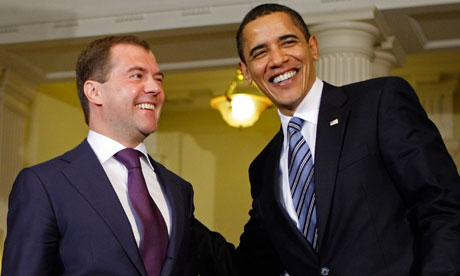
US spies intercepted communications of the then Russian president, Dmitry Medvedev, during a G20 summit in London. Photograph: Alexander Zemlianichenko/AP
American spies based in the UK intercepted the top-secret communications of the then Russian president, Dmitry Medvedev, during his visit to Britain for the G20 summit in London, leaked documents reveal.
The details of the intercept were set out in a briefing prepared by the National Security Agency (NSA), America's biggest surveillance and eavesdropping organisation, and shared with high-ranking officials from Britain, Australia, Canada and New Zealand.
The document, leaked by the NSA whistleblower Edward Snowden and seen by the Guardian, shows the agency believed it might have discovered "a change in the way Russian leadership signals have been normally transmitted".
The disclosure underlines the importance of the US spy hub at RAF Menwith Hill in Harrogate, North Yorkshire, where hundreds of NSA analysts are based, working alongside liaison officers from GCHQ.
The document was drafted in August 2009, four months after the visit by Medvedev, who joined other world leaders in London, including the US president, Barack Obama, for the event hosted by the British prime minister, Gordon Brown.
Medvedev arrived in London on Wednesday 1 April and the NSA intercepted communications from his delegation the same day, according to the NSA paper, entitled: "Russian Leadership Communications in support of President Dmitry Medvedev at the G20 summit in London – Intercept at Menwith Hill station."
The document starts with two pictures of Medvedev smiling for the world's media alongside Brown and Obama in bilateral discussions before the main summit.
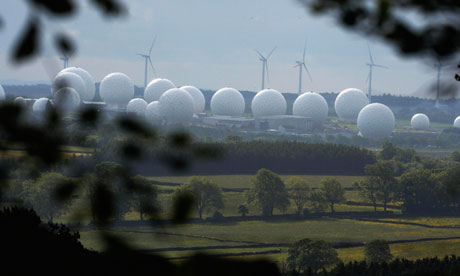 RAF Menwith Hill in North Yorkshire. Photograph: Nigel Roddis/Reuters
RAF Menwith Hill in North Yorkshire. Photograph: Nigel Roddis/Reuters
The report says: "This is an analysis of signal activity in support of President Dmitry Medvedev's visit to London. The report details a change in the way Russian leadership signals have been normally transmitted. The signal activity was found to be emanating from the Russian embassy in London and the communications are believed to be in support of the Russian president."
The NSA interception of the Russian leadership at G20 came hours after Obama and Medvedev had met for the first time. Relations between the two leaders had been smoothed in the runup to the summit with a series of phone calls and letters, with both men wanting to establish a trusting relationship to discuss the ongoing banking crisis and nuclear disarmament.
In the aftermath of their discussions on 1 April, the two men issued a joint communique saying they intended to "move further along the path of reducing and limiting strategic offensive arms in accordance with the treaty on the non-proliferation of nuclear weapons".
A White House official who briefed journalists described the meeting as "a very successful first meeting focused on real issues". The official said it had been important for the men to be open about the issues on which they agreed and disagreed. Obama had stressed the need to be candid, the official noted.
While it has been widely known the two countries spy on each other, it is rare for either to be caught in the act; the latest disclosures will also be deeply embarrassing for the White House as Obama prepares to meet Vladimir Putin, who succeeded Medvedev as president, in the margins of the G8 summit this week.
The two countries have long complained about the extent of each other's espionage activities, and tit-for-tat expulsions of diplomats are common. A year after Obama met Medvedev, the US claimed it had broken a highly sophisticated spy ring that carried out "deep cover" assignments in the US.
Ten alleged Russian spies living in America were arrested.
Putin was withering of the FBI-led operation: "I see that your police have let themselves go and put some people in jail, but I guess that is their job. I hope the positive trend that we have seen develop in our bilateral relations recently will not be harmed by these events." Last month, the Russians arrested an American in Moscow who they alleged was a CIA agent.
The new revelations underline the significance of RAF Menwith Hill and raise questions about its relationship to the British intelligence agencies, and who is responsible for overseeing it. The 560-acre site was leased to the Americans in 1954 and the NSA has had a large presence there since 1966.
It has often been described as the biggest surveillance and interception facility in the world, and has 33 distinct white "radomes" that house satellite dishes. A US base in all but name, it has British intelligence analysts seconded to work alongside NSA colleagues, though it is unclear how the two agencies obtain and share intelligence – and under whose legal authority they are working under.
GCHQ intercepted foreign politicians' communications at G20 summits
Exclusive: phones were monitored and fake internet cafes set up to gather information from allies in London in 2009
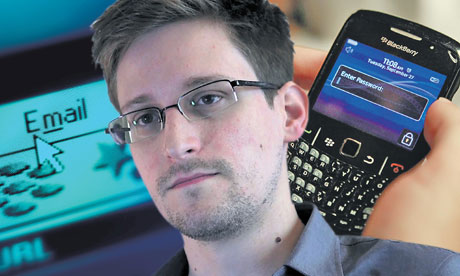
Documents uncovered by the NSA whistleblower, Edward Snowden, reveal surveillance of G20 delegates' emails and BlackBerrys. Photograph: Guardian
Foreign politicians and officials who took part in two G20 summit meetings in London in 2009 had their computers monitored and their phone calls intercepted on the instructions of their British government hosts, according to documents seen by the Guardian. Some delegates were tricked into using internet cafes which had been set up by British intelligence agencies to read their email traffic.
The revelation comes as Britain prepares to host another summit on Monday – for the G8 nations, all of whom attended the 2009 meetings which were the object of the systematic spying. It is likely to lead to some tension among visiting delegates who will want the prime minister to explain whether they were targets in 2009 and whether the exercise is to be repeated this week.
The disclosure raises new questions about the boundaries of surveillance by GCHQ and its American sister organisation, the National Security Agency, whose access to phone records and internet data has been defended as necessary in the fight against terrorism and serious crime. The G20 spying appears to have been organised for the more mundane purpose of securing an advantage in meetings. Named targets include long-standing allies such as South Africa and Turkey.
There have often been rumours of this kind of espionage at international conferences, but it is highly unusual for hard evidence to confirm it and spell out the detail. The evidence is contained in documents – classified as top secret – which were uncovered by the NSA whistleblower Edward Snowden and seen by the Guardian. They reveal that during G20 meetings in April and September 2009 GCHQ used what one document calls "ground-breaking intelligence capabilities" to intercept the communications of visiting delegations.
This included:
• Setting up internet cafes where they used an email interception programme and key-logging software to spy on delegates' use of computers;
• Penetrating the security on delegates' BlackBerrys to monitor their email messages and phone calls;
• Supplying 45 analysts with a live round-the-clock summary of who was phoning who at the summit;
• Targeting the Turkish finance minister and possibly 15 others in his party;
• Receiving reports from an NSA attempt to eavesdrop on the Russian leader, Dmitry Medvedev, as his phone calls passed through satellite links to Moscow.
The documents suggest that the operation was sanctioned in principle at a senior level in the government of the then prime minister, Gordon Brown, and that intelligence, including briefings for visiting delegates, was passed to British ministers.
A briefing paper dated 20 January 2009 records advice given by GCHQ officials to their director, Sir Iain Lobban, who was planning to meet the then foreign secretary, David Miliband. The officials summarised Brown's aims for the meeting of G20 heads of state due to begin on 2 April, which was attempting to deal with the economic aftermath of the 2008 banking crisis. The briefing paper added: "The GCHQ intent is to ensure that intelligence relevant to HMG's desired outcomes for its presidency of the G20 reaches customers at the right time and in a form which allows them to make full use of it." Two documents explicitly refer to the intelligence product being passed to "ministers".
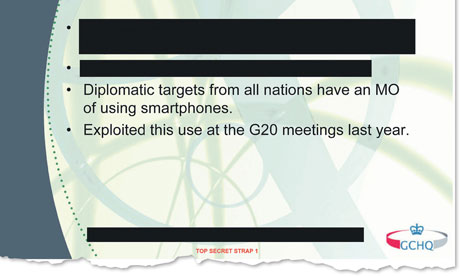 One of the GCHQ documents. Photograph: Guardian
One of the GCHQ documents. Photograph: Guardian
According to the material seen by the Guardian, GCHQ generated this product by attacking both the computers and the telephones of delegates.
One document refers to a tactic which was "used a lot in recent UK conference, eg G20". The tactic, which is identified by an internal codeword which the Guardian is not revealing, is defined in an internal glossary as "active collection against an email account that acquires mail messages without removing them from the remote server". A PowerPoint slide explains that this means "reading people's email before/as they do".
The same document also refers to GCHQ, MI6 and others setting up internet cafes which "were able to extract key logging info, providing creds for delegates, meaning we have sustained intelligence options against them even after conference has finished". This appears to be a reference to acquiring delegates' online login details.
Another document summarises a sustained campaign to penetrate South African computers, recording that they gained access to the network of their foreign ministry, "investigated phone lines used by High Commission in London" and "retrieved documents including briefings for South African delegates to G20 and G8 meetings". (South Africa is a member of the G20 group and has observer status at G8 meetings.)
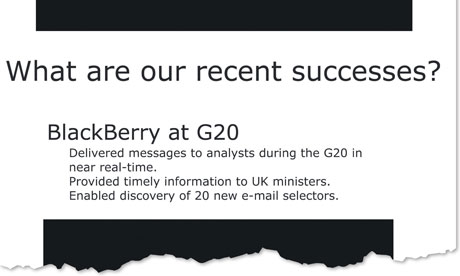 Another excerpt from the GCHQ documents. Photograph: Guardian
Another excerpt from the GCHQ documents. Photograph: Guardian
A detailed report records the efforts of the NSA's intercept specialists at Menwith Hill in North Yorkshire to target and decode encrypted phone calls from London to Moscow which were made by the Russian president, Dmitry Medvedev, and other Russian delegates.
Other documents record apparently successful efforts to penetrate the security of BlackBerry smartphones: "New converged events capabilities against BlackBerry provided advance copies of G20 briefings to ministers … Diplomatic targets from all nations have an MO of using smartphones. Exploited this use at the G20 meetings last year."
The operation appears to have run for at least six months. One document records that in March 2009 – the month before the heads of state meeting – GCHQ was working on an official requirement to "deliver a live dynamically updating graph of telephony call records for target G20 delegates … and continuing until G20 (2 April)."
Another document records that when G20 finance ministers met in London in September, GCHQ again took advantage of the occasion to spy on delegates, identifying the Turkish finance minister, Mehmet Simsek, as a target and listing 15 other junior ministers and officials in his delegation as "possible targets". As with the other G20 spying, there is no suggestion that Simsek and his party were involved in any kind of criminal offence. The document explicitly records a political objective – "to establish Turkey's position on agreements from the April London summit" and their "willingness (or not) to co-operate with the rest of the G20 nations".
The September meeting of finance ministers was also the subject of a new technique to provide a live report on any telephone call made by delegates and to display all of the activity on a graphic which was projected on to the 15-sq-metre video wall of GCHQ's operations centre as well as on to the screens of 45 specialist analysts who were monitoring the delegates.
"For the first time, analysts had a live picture of who was talking to who that updated constantly and automatically," according to an internal review.
A second review implies that the analysts' findings were being relayed rapidly to British representatives in the G20 meetings, a negotiating advantage of which their allies and opposite numbers may not have been aware: "In a live situation such as this, intelligence received may be used to influence events on the ground taking place just minutes or hours later. This means that it is not sufficient to mine call records afterwards – real-time tip-off is essential."
In the week after the September meeting, a group of analysts sent an internal message to the GCHQ section which had organised this live monitoring: "Thank you very much for getting the application ready for the G20 finance meeting last weekend … The call records activity pilot was very successful and was well received as a current indicator of delegate activity …
"It proved useful to note which nation delegation was active during the moments before, during and after the summit. All in all, a very successful weekend with the delegation telephony plot."

No comments:
Post a Comment